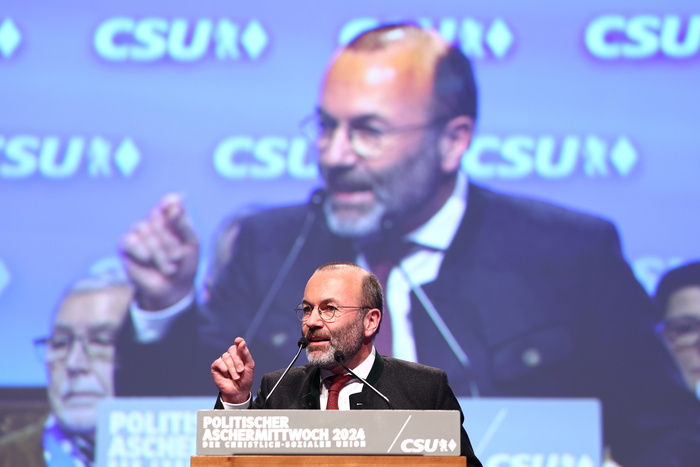The EU's High Representative for Foreign Policy, Josep Borrell, appears with the Turkish Foreign Minister, Mevlut Cavusoglu, last Thursday in Brussels. STEPHANIE LECOCQ / EFE
The European Union has welcomed with both enthusiasm and distrust Turkey's sudden turn towards a negotiated solution to the geostrategic conflicts that during 2020 led it to clash with France, Greece or Cyprus.
The EU Foreign Ministers, who meet this Monday in Brussels, plan to claim the Turkish President, Recep Tayyip Erdogan, reliable evidence that his new attitude will continue over time and, above all, that it will lead to a de-escalation from the enormous tension accumulated in recent months in the eastern Mediterranean, where the armed clash between Turkish and European ships came to be brushed against.
"No partner has proposed so far that the procedure to impose new sanctions on Turkey be halted," says a community source on the eve of the meeting of the EU Foreign Ministers Council.
The same source underlines that to definitively clear the tension between the EU and Turkey "we need very clear and positive steps from Ankara."
Brussels, however, is satisfied by the change of mood in the Turkish government, announced by Erdogan himself at the beginning of the year and confirmed last week by his Foreign Minister, Mevlüt Çavusoglu during a visit to the community capital.
Erdogan's second step, more significant still, will take place this Monday in Istanbul with the launch of some "exploratory talks" between Turkey and Greece to try to resolve the discrepancies on the demarcation of territorial waters that have caused the recent shocks on account of gas prospecting in disputed areas.
This is the first meeting on that conflict since 2016.
And the third sign of goodwill could come with the restart also of the reconciliation process on Cyprus sponsored by the United Nations and in which the authorities of the two parts of the island (the Turkish-Cypriot and the Greek-Cypriot) as well as Turkey participate, Greece and UK.
Erdogan's change seems to guarantee the success of the way of understanding with Ankara fed by the governments of Angela Merkel and Pedro Sánchez in the face of the heavy hand demanded by France, Greece and Cyprus.
Erdogan's turn also coincides with the change in the White House that a US administration anticipates much more demanding than that of Donald Trump with respect to international order.
Even so, not even the European capitals most prone to dialogue with Erdogan are still completely trusting.
"We have seen a 180 degree turn from Turkey in relation to Greece, Cyprus and other issues but it has happened other times and it has not materialized," warns a European source.
"It will be necessary to verify if the new situation is sustainable and, in the meantime, the sanctions framework will remain in force."
The extension of the sanctions was agreed at the European summit last December as punishment for what the European Council described as "unilateral and provocative activities by Turkey in the eastern Mediterranean."
The Council also accused Turkey of launching "an escalation in its rhetoric against the EU, its member states and European leaders."
The clash became frontal in 2020. France withdrew its ambassador to Ankara after Erdogan suggested that French President Emmanuel Macron should undergo a "mental check."
But both leaders have regained contact, at least by letter, as a result of the Frenchman's contagion of covid-19 and the congratulations on the end of the year.
And the waters of the eastern Mediterranean, although not completely calm, seem calmer than during 2020.
Contacts have intensified at the start of the year to try to consolidate the new climate of understanding.
German Foreign Minister Heiko Maas visited Ankara last week with negotiations between Turkey and Greece on Monday as the main item on his agenda.
A few days before, the Turkish Foreign Minister visited Madrid and was received by both his counterpart, Arancha González-Laya, and the President of the Government, Pedro Sánchez.
The Turkish minister was completing his alleged reconciliation tour with the EU in Brussels.
Last Thursday and Friday, Çavusoglu met with top EU authorities and NATO Secretary General Jens Stoltenberg, in what is seen as the first step in Erdogan's reconciliation strategy with his Western allies and partners. .
After Cavusoglu's meeting with the President of the European Council, Charles Michel, European sources expressed “the importance of maintaining the de-escalation of tension in the Mediterranean” and “the desire to maintain a positive relationship with Turkey”.
The EU High Representative for Foreign Policy, Josep Borrell, also described his meeting with the Turkish minister as "cordial and frank" and reiterated that for Europe "it is of strategic interest to maintain mutually beneficial relations with Turkey."
But the friction points are very numerous and at any moment sparks could fly again.
Apart from the conflicts with Greece and Cyprus, the Turkish belligerence in Libya, Syria or the Caucasus worries European partners, especially France.
And the EU expresses over and over again its concern about the situation of human rights and freedoms in a country that in 2005 began negotiations to join the community club but now seems more remote than ever.
The relationship between Brussels and Ankara in the last five years has become almost purely financial.
Both parties reached an agreement in 2015 whereby Turkey promised to stop the Syrian exodus to Europe in exchange for 6,000 million euros to keep four million refugees in its territory.
Last December, the last 780 million euros of that item were awarded, which could lead Ankara to demand new budgetary concessions, especially after the aid granted to finance preparation for entry into the EU has gone cutting in view of the lack of reforms (up to 168 million in 2020 from 500 million a year on average) and could disappear given the slim possibilities that the country will become integrated while Erdogan is in power.

/cloudfront-eu-central-1.images.arcpublishing.com/prisa/S4B3SGDPOMLHWCGT6OESNMGULI.jpg)












